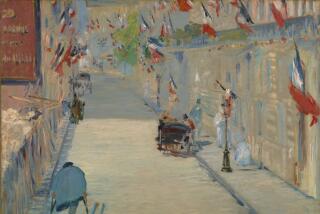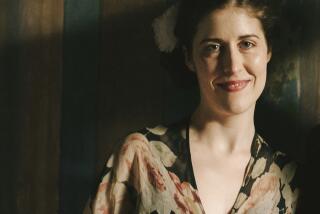Discoveries: ‘The King of Kahel,’ ‘The Blind Owl’ and ‘Job’
The King of Kahel
Tierno Monénembo, translated from the French
Nicholas Elliott
Amazon Crossing: 289 pp., $13.95 paper
It’s “The Little Prince” with a hint of “Curious George” and a smidgen of “Gulliver’s Travels.” Based on the real life of 19th century explorer Olivier de Sanderval, this novel travels outward from the dreams of an 8-year-old boy who would be king. When he gets old enough to make his dreams reality, Olivier departs, at age 40 in 1879, from the port of Marseille, France, to colonize his corner of Africa, Fouta Djallon. From his great uncle and his tutor, he has caught the “colonies bug” — he dreams of coconut trees, mandrills and bloodthirsty savages between Latin lessons. He longs for a kingdom to try out his ideas, build railroads, make scholars out of cannibals. The son of chemists, he is the child of a “feverish, conquering, and inventive era,” the turning point in history when curiosity and exploration became gluttonous grabs for resources and territory to feed decrepit civilizations. French Guinea is Olivier’s dollhouse, but Africa claims his soul in the end. Tierno Monénembo was born in Guinea. He has written nine books and a play. It is worth noting that this is the first book by a new imprint — Amazon Crossing, which will publish English translations of books from around the world.
The Blind Owl
Sadegh Hedayat, translated from the Persian by D.P. Costello
Grove Press: 146 pp., $14 paper
First released in serial form in 1941, “The Blind Owl” is one of the most famous Persian novels in Iran, widely considered the first modernist fiction to be published in that country. Sadegh Hedayat translated Kafka and Chekhov into Persian — his work is often compared to Kafka and more often Poe. “The Blind Owl” is considered a dangerous book — not for mere political reasons but because it is so deeply, psychologically bleak. The narrator, a painter obsessed with the vision of a woman, fades into a delirious opium-induced dream state and commits suicide. At 48, the author also committed suicide. That said, it is a book full of beauty, a book that tunnels into one’s consciousness wielding two of beauty’s best weapons, the brush and the pen. When the novel opens, the narrator confesses his fears: of the abyss opening between himself and others, and of the possibility that he will die without knowing himself. “I am writing only for my shadow,” he claims, and we believe him, for this is one of the most intimate books in all of literature, “which is now stretched across the wall in the light of this lamp. I must make myself known to him.”
Job
Joseph Roth, translated from the German by Ross Benjamin
Archipelago Books: 212 pp., $17 paper
Here are the tribulations, the Angela’s ashes of Mendel Singer, a God-fearing man, a poor teacher in Russia at the precipice of World War II. You can picture him like a folded crow, his black frock coat flapping as he hurries home to his suffering wife and their four children. The two oldest, who are boys, go off to war—one defects, however, to America, where he becomes wealthy and writes for his family to join him. The third, a daughter, runs off with a Cossack and ends up in an insane asylum. The fourth, Menuchim, is crippled. His mother believes what the rabbi told her, that she must never leave him. When she goes with her husband and daughter to join their son in America, leaving Menuchim wailing on the threshold, she believes her sin has destroyed them. Like the story of Job, Mendel’s life is one endless test, with a twinkling possibility for miracles. His god’s capriciousness beats like black wings through the novel, driving the characters, scattering their fates. Yes, there is a moral here, but not necessarily the one on the marquee in the biblical tale.
Salter Reynolds is a writer in Los Angeles.
More to Read
The biggest entertainment stories
Get our big stories about Hollywood, film, television, music, arts, culture and more right in your inbox as soon as they publish.
You may occasionally receive promotional content from the Los Angeles Times.










